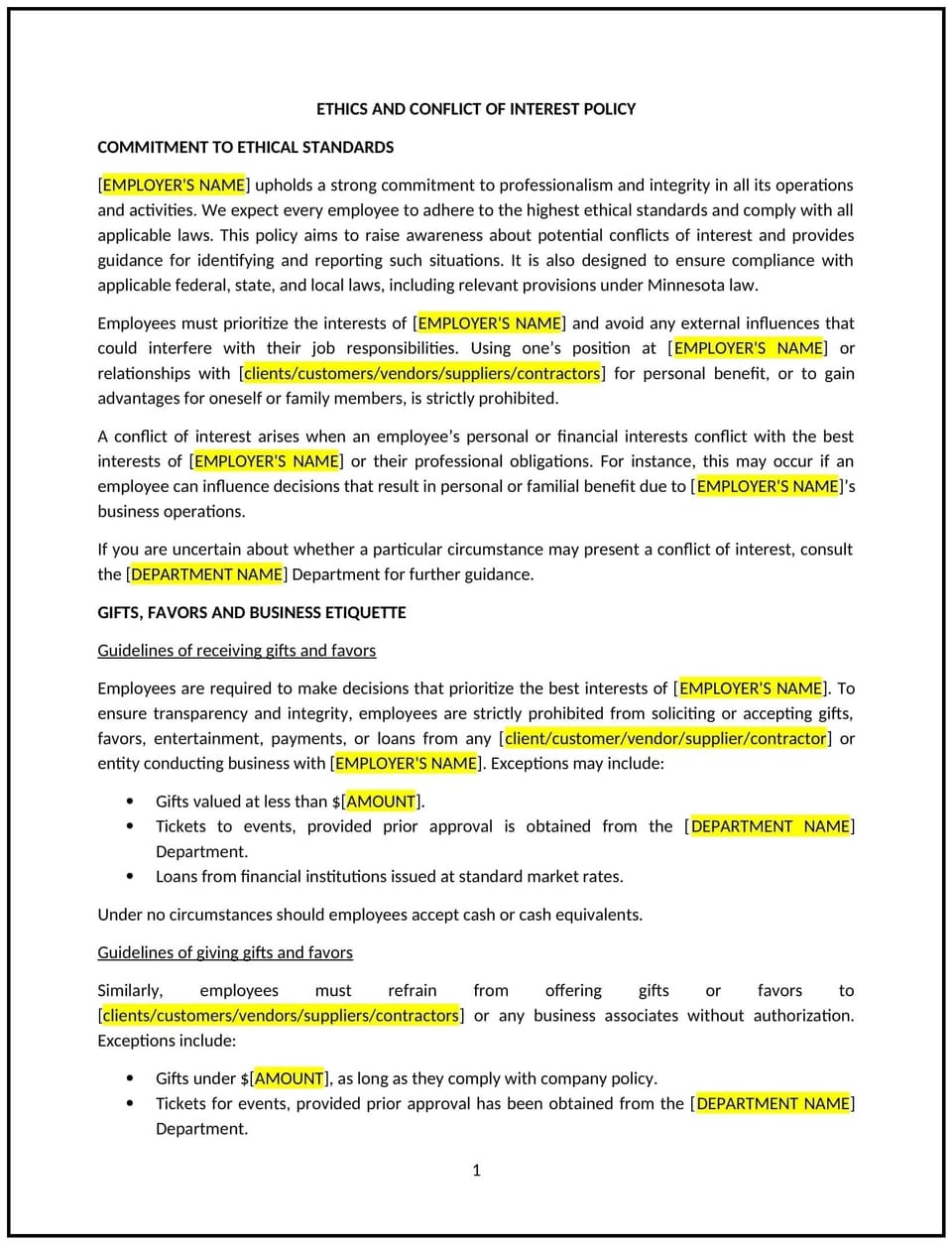Ethics and conflict of interest policy (Minnesota): Free template

Ethics and conflict of interest policy (Minnesota)
This ethics and conflict of interest policy is designed to help Minnesota businesses establish clear guidelines for identifying and addressing potential conflicts of interest, ensuring that employees and management act in the best interest of the company. It outlines the principles of ethical conduct and provides procedures for disclosing, managing, and resolving conflicts that may arise.
By implementing this policy, businesses can maintain a culture of integrity, transparency, and fairness, ensuring that personal interests do not interfere with professional duties.
How to use this ethics and conflict of interest policy (Minnesota)
- Define conflicts of interest: Clearly explain what constitutes a conflict of interest, such as situations where personal, familial, or financial interests could influence an employee's professional decisions or actions.
- Establish disclosure procedures: Outline how employees should disclose potential conflicts of interest, including who to report to (e.g., HR, legal, or management) and the timeframe for disclosure.
- Set ethical standards: Define the ethical standards employees are expected to uphold, such as acting with honesty, integrity, and fairness, and avoiding situations where their judgment could be compromised.
- Provide guidelines for managing conflicts: Detail the steps that should be taken when a conflict of interest is identified, including the process for resolving the conflict, whether through recusal, reassignment of duties, or other actions.
- Address business relationships: Include guidelines for managing conflicts that may arise from personal relationships, such as when an employee has a close relationship with a vendor, client, or competitor.
- Establish monitoring and enforcement: Set up procedures for monitoring potential conflicts of interest and enforcing the policy, including disciplinary action for violations.
Benefits of using an ethics and conflict of interest policy (Minnesota)
Implementing this policy provides several advantages for Minnesota businesses:
- Promotes integrity: Encourages employees to act ethically and with transparency, fostering a culture of trust and accountability within the organization.
- Reduces risk of legal or financial issues: Identifying and addressing conflicts of interest early can prevent potential legal or financial risks related to unethical behavior.
- Enhances decision-making: By addressing conflicts of interest, businesses ensure that decisions are made based on what is best for the company, rather than being influenced by personal gain.
- Protects reputation: Demonstrating a commitment to ethical behavior helps build and maintain a positive company reputation with clients, stakeholders, and the community.
- Reflects Minnesota-specific considerations: Tailors the policy to comply with Minnesota’s laws and regulations regarding conflicts of interest and ethical conduct, addressing local business practices and expectations.
Tips for using this ethics and conflict of interest policy (Minnesota)
- Communicate clearly: Ensure that all employees understand the policy, its importance, and how to disclose potential conflicts of interest.
- Offer training: Provide regular training on recognizing and managing conflicts of interest, as well as the ethical standards the company expects from all employees.
- Monitor adherence: Regularly monitor employee behavior to ensure that conflicts of interest are identified and addressed promptly.
- Create a culture of transparency: Encourage employees to openly discuss potential conflicts and concerns, ensuring that they feel comfortable disclosing situations without fear of retaliation.
- Review and update regularly: Review the policy annually to ensure it remains relevant to the business, changes in local laws, and any evolving industry practices in Minnesota.
Q: What constitutes a conflict of interest under this policy?
A: A conflict of interest occurs when an employee’s personal, familial, or financial interests interfere with their ability to make objective, impartial decisions in the best interest of the business. Examples include having a financial stake in a competitor or working for a vendor that does business with the company.
Q: How should employees disclose a conflict of interest?
A: Employees should disclose any potential conflicts of interest to HR or management as soon as they are aware of the situation. The disclosure can be made in writing or verbally, depending on the company's procedure.
Q: What happens if a conflict of interest is identified?
A: Once a conflict is disclosed, the business should assess the situation and take appropriate actions to resolve the conflict, such as reassigning duties, having the employee recuse themselves from a decision-making process, or implementing other solutions.
Q: Can an employee continue to work with a vendor if they have a personal relationship with them?
A: Businesses should establish guidelines for such situations, often recommending that employees disclose the relationship and recuse themselves from decision-making regarding that vendor to avoid the appearance of bias.
Q: How can businesses monitor for conflicts of interest?
A: Businesses should regularly review employee activities and business relationships to ensure that conflicts of interest are being managed effectively. Employees should be encouraged to proactively disclose potential conflicts.
Q: How will violations of this policy be handled?
A: Violations of the policy should be addressed promptly and may result in disciplinary actions, including reassignment of duties, a formal warning, or, in severe cases, termination. Businesses should ensure that all disciplinary actions are consistent with company values and procedures.
Q: How often should this policy be reviewed?
A: The policy should be reviewed annually, or whenever there are changes to the company’s operations, new legal requirements in Minnesota, or emerging best practices in conflict of interest management.
This article contains general legal information and does not contain legal advice. Cobrief is not a law firm or a substitute for an attorney or law firm. The law is complex and changes often. For legal advice, please ask a lawyer.


